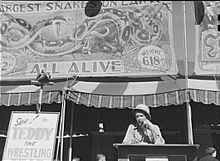Commander in Chief
A recruiter (via French recommander ' to talk someone a little bit violently' , 'recommend' from Latin recommendare 'recommend' , 'offer'; also: promoter , crier ) is a person who accompanies the happening at a ride with funny sayings and on them Way is to encourage the passing folk festival visitors to ride / use. Usually the commander is also responsible for controlling the ride and selling the driving chips . Often he also takes on the sound reinforcement for the ride as a DJ .
history
Until well into the 20th century, recruiters attracted visitors to the show booths , including menageries , panoptics , fairground variety shows, abnormality shows, and magic booths. On the podium in front of the show booth, the commanders tried loudly to encourage the folk festival visitors strolling past to stop and then to attend the shows. In doing so, they used the means of exaggeration, but often also a popular, crude-ironic humor.
Good recruiters who were able to respond precisely to the audience at the respective fairgrounds were decisive for the economic success of an exhibition. It was not uncommon for the show booth principals to appear as re-commanders themselves. The "heaters" of larger open raffle deals are also to be counted among the recomendants, provided that they encourage the public to buy the raffle with appropriate remarks. Recomendants used to stand in front of cinemas to attract viewers.
useful information
- The main character of the musical Carousel is a re-commander, as does Liliom, who appears as a re-commander in the play of the same name, which served as a model for Carousel .
- The show booth owner Michael Augustschichtl gained regional fame for his original parades at the Munich Oktoberfest .
See also
Web links
- “Come in, then you can look out!” Commander-in-chief at the Bremen Freimarkt. Buten un Binnen , Radio Bremen TV
- Rudolf Neumaier: All right, baby? Schubidu! In: süddeutsche.de. September 29, 2013, accessed October 23, 2016 .
Individual evidence
- ^ A b Ansgar Schlichter: Rekommandeur . In: Lexicon of film terms . Bender, September 17, 2012, ISSN 1610-420X ( filmlexikon.uni-kiel.de [accessed on October 23, 2016]).
- ↑ Fair job: Commander in chief. Deutsche Welle, accessed on October 23, 2016 .
- ↑ Susanne Blume Berger: Wien 1938 - The end of many careers. Using the example of the translator Marie Franzos (1870–1941) . University of Vienna, Vienna December 2006, p. 47 , Salten, Felix ( PDF [accessed October 23, 2016]): “In fact, it was often the owners of the cinemas and show booths themselves, and talented recruiters occasionally made it to the top, as contemporary reports in film magazines show to "actor" (actor) on a theater stage, sometimes even more. "
